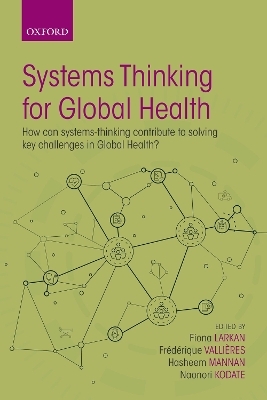
Systems Thinking for Global Health
Oxford University Press (Verlag)
9780198799498 (ISBN)
How can systems-thinking contribute to solving key challenges in Global Health?
Global Health is an evolving field operating within a complex interaction of political, environmental, economic, and socio-cultural factors. Any work on the subject needs to reflect current developments and be supported by a collaborative, interdisciplinary approach that retains a focus on the underpinning determinants of health. This book reflects the importance of applying a systems-thinking approach to Global Health challenges: one that examines both the individual elements within the system as well as the interrelationships between them and wider contextual patterns.
Bringing together a global and multidisciplinary team of experts, this volume outlines the core concepts of a systems-thinking approach and how they can be applied to current Global Health problems. It provides a comprehensive range of case studies, reflections, conceptual pieces, and methodological approaches. Readers are invited to engage with arguments and assumptions across global health interventions and to connect systems-thinking theory with lived experiences. Well-established topics such as infectious and non-communicable diseases, as well as lesser-discussed areas such as still birth, mental health, and war and conflict are united under a shared systems-thinking framework.
Offering innovative perspectives on current health challenges, students, academics, practitioners, and policy makers will find this a significant resource to enhance their understanding and application of systems-thinking in Global Health.
Fiona Larkan completed her BA, MA and PhD (2007) at Maynooth University in the Department of Anthropology and served as the Director of the MSc Global Health in Trinity College Dublin from 2010 until 2017. Fiona devoted her career to sharing the voices and experiences of people living with HIV and AIDS in South Africa and Ireland to advocate for more inclusive health care for some of society's most marginalised populations. As a teacher and the Director of the MSc Global Health, she counselled hundreds of students, inspiring them to think critically and to question systems that promote existing inequities, and thus gifting the world a future generation of capable and responsible Global Health researchers. Frédérique Vallières is an Associate Professor of Global Health at Trinity College Dublin where she also serves as the Director of the Trinity Centre for Global Health. She has over a decade of experience in research in Global Health, conducting research across sub-Saharan Africa, Asia, and the Middle East. Her current research focuses on the application of Psychology to Global Health, specifically focusing on Global Mental Health, Health System Strengthening, and Human Resources for Health. Aligned with systems thinking approaches, Frédérique prioritises working in close collaboration with a large network of influential local and international non-governmental organisations as well as public bodies to ensure that research findings are integrated for improved practice and policy. Frédérique holds a BSc. from McGill University (Montréal, Canada) and a MSc. in Global Health from Trinity College Dublin (Dublin, Ireland). Hasheem Mannan completed his PhD on disability policy and family studies at the University of Kansas, USA in 2005. He was a Senior Research Fellow at the Nossal Institute for Global Health, University of Melbourne and Senior Research Fellow at the Centre for Global Health, Trinity College Dublin. He also held a two year Marie Curie Fellowship, Trinity College Dublin. He has worked for the University of Kansas, the World Health Organization, the US National Center for Health Statistics, and the National Disability Authority (Ireland). He held the following scholarships: British Chevening, Grace M. Phinney, David M. Dahlke Memorial, and International Student Scholarship. He was awarded Phi Beta Delta International Student Award for Excellence in International Education by the University of Kansas. Hasheem's areas of expertise include content analysis of health policies; human resources for health and service delivery; disability measurement and statistics; and social inclusion. Naonori Kodate holds a BA (International Relations) and LL.M from the University of Tokyo, MSc in European Politics and Policy, and a Ph.D in Political Science from the London School of Economics and Political Science. His main research interests include comparative public policy, and science, technology and society (STS) studies, particularly in the use of eHealth (e.g. home care robots) in older people's care, patient safety, and gender equality in STEM education. Nao is the Principal Investigator of a Toyota Foundation-funded international research project "Harmonisation towards the establishment of Person-centred, Robotics-aided Care System (HARP: RoCS)". He co-produced a documentary film “Circuits of Care: Ageing and Japan's Robot Revolution”.
| Erscheinungsdatum | 21.10.2022 |
|---|---|
| Verlagsort | Oxford |
| Sprache | englisch |
| Maße | 156 x 235 mm |
| Gewicht | 666 g |
| Themenwelt | Medizin / Pharmazie ► Gesundheitswesen |
| Studium ► Querschnittsbereiche ► Prävention / Gesundheitsförderung | |
| Sozialwissenschaften ► Soziologie | |
| ISBN-13 | 9780198799498 / 9780198799498 |
| Zustand | Neuware |
| Informationen gemäß Produktsicherheitsverordnung (GPSR) | |
| Haben Sie eine Frage zum Produkt? |
aus dem Bereich


